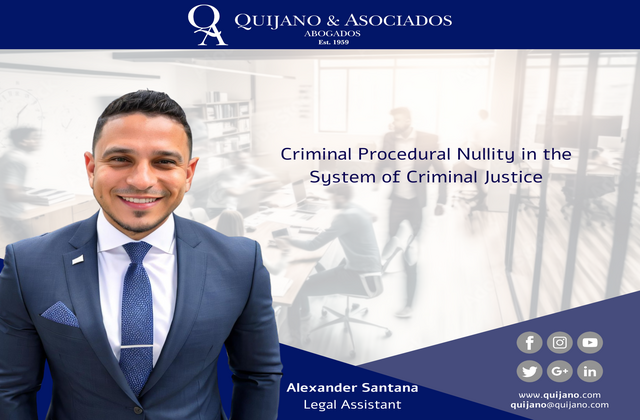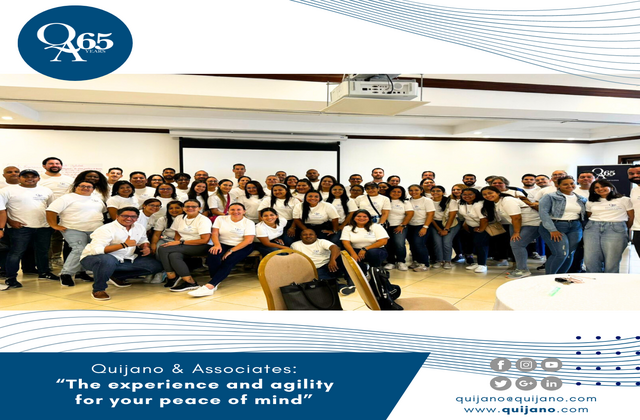Criminal Procedural Nullity in the System of Criminal Justice

Nullity is one of the procedural figures or instruments maintained by our System of Criminal Justice, whose function is to declare certain procedural acts that violate the fundamental rights of any of the parties null and void. These incidents that affect due process cause defects to exist within it and “Procedural Nullity” to occur, which must be demonstrated once the case and its significance are analyzed.
Where is it regulated in our Code of Criminal Procedure?
Pursuant to Title III “Procedural Nullities”, from article 198 to 200 of the Code of Criminal Procedure of the Republic of Panama establishes that:
“ Judicial or legal proceedings with defects in the process that cause harm to any intervening party are voidable, and can only be remedied with the declaration of nullity .” The prejudice exists when failure to comply with the procedural forms or procedures threatens the possibilities of action of any of the parties involved in the procedure.
The intervening party in the procedure who is harmed by the defect and who did not contribute to causing it may request a declaration of nullity . The nullities will be corrected if the prejudice intervening party in the procedure does not request his declaration in a timely manner, if he expressly or tacitly accepts the effects of the legal proceeding and if, despite the defect, the act fulfills its purpose with respect to all interested parties.
How may I request the Nullity?
Very important! We can point out that judicial actions or proceedings that cause prejudice to any intervening party will only be “remedied” through the declaration of nullity, this means that; Once the request for procedural nullity has been proven and admitted, the case becomes ineffective, and its definitive archive is ordered. This incident of nullity of the legal proceedings is a means of challenge of an extraordinary nature that is asserted against violations of fundamental rights that have not been reported before and, as we have mentioned, its purpose is to annul the res judicata in a final judgment.
They are presented and must go to the prosecutor’s office that knows the process and request a hearing before the Judge of Constitutional Guarantees.
Now, our Law declares that for there to be a procedural nullity there must be a prejudice caused through the defect, as we have mentioned, the injured party must notice the error, indicating the factual and legal foundations that clearly evidence the reason for its loss and the reasons for invalidation; That is to say, if the irregularity is due to a lack of competence, a violation of fundamental guarantees or if it is derived from illicit evidence, and in turn, prove that the reported anomaly had a negative and decisive impact on the meaning of the accused act. as vitiated by nullity, and which therefore requires the invalidation of the action to restore the violated right.
Our Code of Criminal Procedure mentions two types of nullity, which are:
- Absolute procedural nullity: It is that which is determined as null to the legal or judicial process when the defect has prevented the intervening party from the full exercise of the guarantees and rights recognized in the law, the Political Constitution and the ratified international treaties or conventions. For the Republic of Panama, this nullity is insurmountable , and;
- Ex officio Nullity: It is the one that occurs when the court considers that a vitiated act has occurred and the nullity has not yet been resolved, it will inform the person involved in the procedure to whom the nullity causes damage, in order to proceed as he deems appropriate to his rights, unless it is an absolute procedural nullity, in which case he may declare it ex officio.
In accordance with these descriptions of the nullities established in our regulations, we would like to point out that in judicial practice it has been ruled that nullity is a sanction for procedural irregularity that translates into ostensible violations of the rights of the accused, one of which is the right of defense. But also, it is the legal invalidity of the procedural relationship, due to lack of budgets for its constitution, or of acts carried out in the process, imperfectly or irregularly due to non-observance of conditions of form, manner or time, indicated by the law as essential for the procedural action to produce effect.
According to the Italian jurist, Francesco Carnelutti (May 15, 187– March 8, 1965), considered along with Piero Calamandrei, Giuseppe Chiovenda and Eduardo Juan Couture, one of the most influential proceduralists of all time, establishes that when the cause of the act is not reached except through a legal act, the act is of no use at all, is ineffective or invalid, and its ineffectiveness is also called “nullity”; therefore, the act is void in the opinion of Carnelutti and in turn the act is ineffective.
Things being this way, our judgment is to consider that the actions by the Public Ministry through the prosecutors who are in charge of investigating the case, must be clear about the due procedure in the actions, since it corresponds to the logical parameters. and substantiation of the cause of nullity that has been presented, which requires adducing clear and precise demonstrative guidelines in accordance with the meaning of the selected cause: for example, if the cause of nullity is derived from illicit evidence; if the nullity corresponds to the judge’s incompetence; or if the nullity is due to the violation of the fundamental guarantees established in our Constitution.
We then refer to the causes as:
- Nullity derived from illicit evidence: It is that obtained and that violates the fundamental guarantees, therefore; It is null and void and must be excluded from the procedural action, meaning the attenuated link, the inevitable discovery, and the source from which said evidence arises;
- Nullity due to violation of fundamental guarantees: The cause of nullity is the violation of the right of defense or due process in substantial aspects.
Finally, we want to indicate that the importance and significance that the guarantees and principles have for the development of the process, have not only been determined in various types of criminal procedures but are discovered insofar as the violation of fundamental guarantees is a cause for the nullity of the acted and exclusion of evidence and acts, as is also the basis for the extraordinary appeal, which in itself imposes the obligation of its study and knowledge in depth and never as a mere reference and much less putting the efficiency of a judicial result.
If you consider that you are being a victim of an arbitrariness constituting a nullity defect in a judicial process, we recommend hiring the services and legal advice of a suitable lawyer who is kept up to date on these issues, for which Quijano & Asociados expert law firm which has a lot of experience in litigation and is constantly updated in this area, so the reader should not hesitate to contact us to find solutions.




